By the Sukarya Team
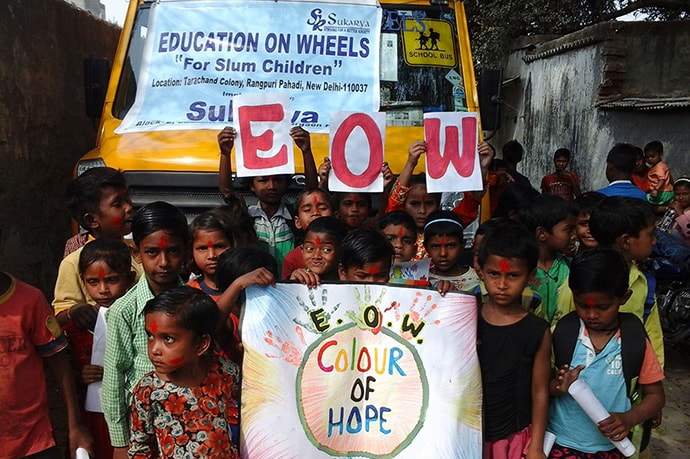
Empowering our community one smile at a time through education and play. Photo: Sukarya
Gender equality and Education are intertwined with each other and have been the essential pillars for ensuring inclusive economic growth and social development. However, developing countries have not been able to effectively promote gender equality and provide education. While social stigmas and lack of awareness are the primary barriers for promoting gender equality, lack of resources and access have been detrimental for providing education. India is no exception as it was ranked 135th (out of 146 countries, in 2022) in gender parity by World Economic Forum (WEF). Although India ranks 33rd in terms of education, the access to education is a challenge among rural and socio-economically marginalized communities. At a time when India’s economic growth is booming, there is a need for grassroot level programs that address the challenges and help in achieving these Sustainable Development Goals (SDGs).
“Sukarya” a Non-profit Advocating for Education & Empowerment
Sukarya is a Non-Governmental Organization (NGO) working on promoting gender-equality and providing education by engaging communities through targeted and customized programs. Operating in urban slums (in India), Sukarya has been delivering curriculum-based gender equality program and providing education through its flagship “Education on Wheels (EOW)” program (since 2017). The basis for functional facets of the programs have been United Nations (UN) guidelines under the Sustainable Development Goals (SDGs). Based on the defined scope of the gender equality and education programs, SDG indicators are being used to measure the progress. However, variations in the cultural factors, socio-economic factors, and resource availability, have led to adoption of innovative approaches to improve the outcomes. Engaging communities and incorporating their feedback in restructuring the programs has helped in overcoming challenges. Further, the presence of global experts, members, and an ever-increasing pool of advisers, has been a hallmark of Sukarya’s success. It is a combination of the above-mentioned factors, which contributed to Sukarya’s recognition as one of the top 10 NGO’s working for boosting education of girls among underprivileged communities. GuideStar India Champion level – Platinum certification, and accreditation as a member of “Credibility Alliance for Desirable Norms”, reflect Sukarya’s caliber.
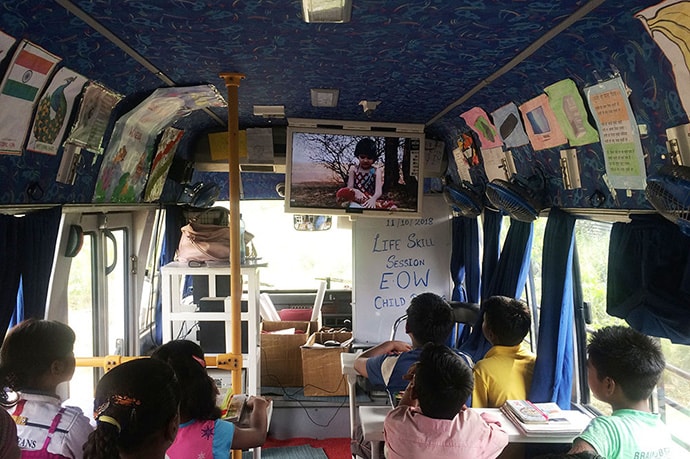
Bringing hope, education, and opportunity to marginalized communities. Photo: Sukarya
Sukarya’s Gender Equality Program – Empowering Adolescent Girls for a Brighter Tomorrow
In India, there is lack of access to knowledge and credible information pertaining to adolescent sexual and reproductive health, and gender education. Cultural practices, societal stigmas, and limited access to education and healthcare have been the primary contributing factors. These factors have resulted in permeation of misinformation and myths, gender discrimination and violence, and sexual and reproductive health issues in adolescent girls. Especially, adolescent girls belonging to socio-economically backward communities are extremely vulnerable. Gender inequality is the major outcome of these existing differences, and there is a need for holistic
approach to tackle these challenges for promoting gender equality.
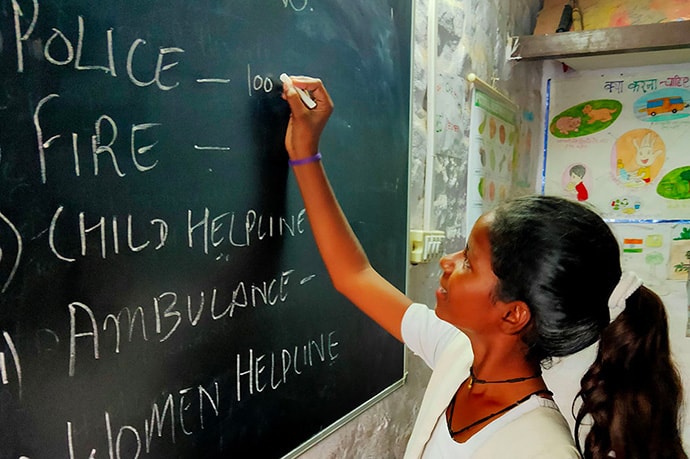
Leading the way for social change. Photo: Sukarya
Sukarya has adopted a three-pronged approach for promoting gender equality at the grassroot level. The inspiration behind this approach is to deliver validated and evidence-based knowledge and information in a presentable and understandable way, for adolescent girls to overcome the barriers and take charge of their lives. Activities under this program are delivered at the community level and at schools for adolescent girls. Gender equality program consists of the following components to address existing challenges:
- Basic knowledge and awareness on reproductive and sexual health, and build skills for family life (for adolescent girls):Under this component validated information about reproductive and sexual health is delivered in educational sessions. Awareness is provided about the importance of understanding puberty related physical and emotional changes, protection from unwanted pregnancies and sexually transmitted infections, and hygiene. In addition, education about family life is offered and skills required for managing it are also provided. This empowers them to make informed choices, comprehend their rights and responsibilities in the family, and develop communication and conflict resolution skills.
- Building basic digital skills, enhancing their abilities for better employability, and awareness on discrimination and social stigmas:Digital inclusion is essential for promoting gender equality, as it expands opportunities for adolescent girls in education and career. Further with tools like social media, they can establish new connections and meet empowered peers for better opportunities. Sukarya believes that building basic digital skills can help in dismantling traditional gender roles and reduce gender-based economic inequalities. Moreover, awareness about discrimination and social stigmas, help adolescent girls identify and overcome these biases. Digitally empowered adolescent girls can become drivers of change within their communities, thereby motivating others to adopt similar practices.
- Promoting the importance of Water, Sanitation and Hygiene (WASH), and Community engagement and communication:The need for WASH related initiatives cannot be undermined, as infectious diseases continue to be prevalent in India. Awareness and education about WASH is provided to adolescent girls for teaching the direct impact of hygiene on health, importance of prevention in reducing healthcare costs, and building skills to promote WASH within their communities. In addition, guidance pertaining to community engagement and communication is provided to build confidence in adolescent girls to be effective drivers of change in their respective communities.
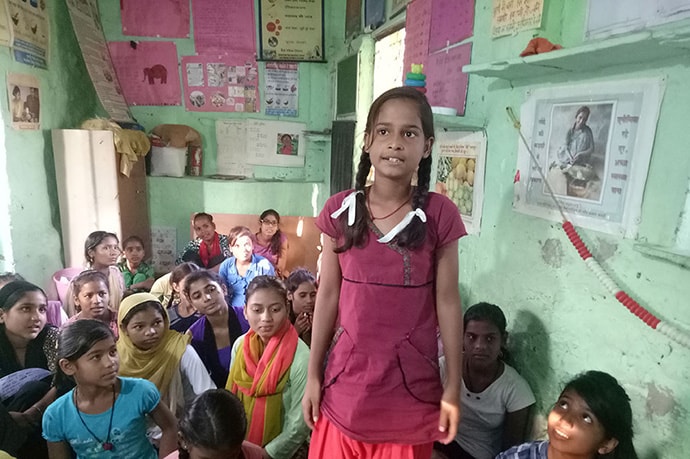
Unlocking the potential of adolescent girls. Photo: Sukarya
With the implementation of above-mentioned activities, Sukarya has benefitted over 10,000 adolescent girls, since the inception of gender equality program in 2017. Multiple success stories of change have been documented, where adolescent girls have stood against childhood marriage and other societal pressures to take charge of their own future. To further strengthen the program outcomes, Sukarya has been looking to partner with organizations willing to provide employability options for the adolescent girls trained under the gender equality program.
Education on Wheels (EOW) – Bridging the Gap to Promote Education for All
Through Education on Wheels (EOW) program, Sukarya provides education to children and adolescents, who otherwise cannot access formal education. A dedicated bus well equipped with required stationary, computers and teachers reaches the communities to deliver education. The education provided is non-formal, however, the students appear for an Open Basic Examination conducted by the Government of India. Students clearing the exam are provided the opportunity to get mainstreamed into formal education system. The program provides a favorable learning environment to children and adolescents who cannot access any type of education. Exposing over 100 students to education every day, the project provides an opportunity for the children to gain minimum knowledge and skills. Remedial classes are offered to those who have missed classes, thereby ensuring continuity. Key programmatic aspects of EOW include:
- Non-formal education provided on life skills, health, nutrition, careers, and values.
- Multi-grade teaching to cover students across various age groups and at different levels, all taught under one single roof.
- Special teaching methods and techniques for fun-based learning to ensure children don’t drop out.
- Basic computer education is also provided.
- Healthy teacher-student interaction, with regular parent teacher meetings.
- Regular feedback obtained from communities to further improve the program.
- Improved bonding between students through annual picnics and celebration of festivals.
- Accessible, affordable, and efficient education with a goal to reach the unreached.
The purpose of EOW program is to improve participation rates in non-formal education, quality teaching, improve completion rates, reduce drop-off, and provide opportunity for formal education. Sukarya’s processes for measuring program impact not only align with some indicators for education related SDG (SDG-4), but also deliver on improving access. To further scale up the program, Sukarya has been looking for partnering with interested organizations.
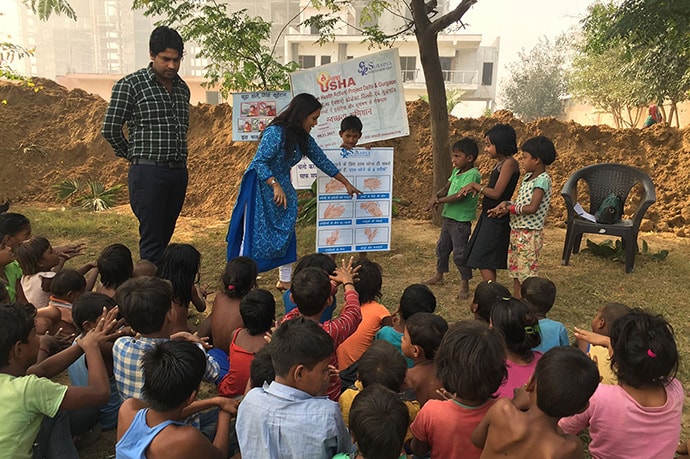
Promoting healthy habits for a brighter future. Photo: Sukarya
Sukarya’s Vision
As gender equality and education gain importance for their role in economic and overall development, there is a need for consistent support for a sustainable program enabling every underprivileged adolescent girl to be healthy, skilled, and trained for employability. In addition to the above-mentioned programs, Sukarya has been working in women empowerment, and providing quality healthcare services. Sukarya’s vision is to enable local communities believe in their own abilities to bring about change by providing them access to basic healthcare, nutrition, and education to live a healthy successful life and strive for a better society.